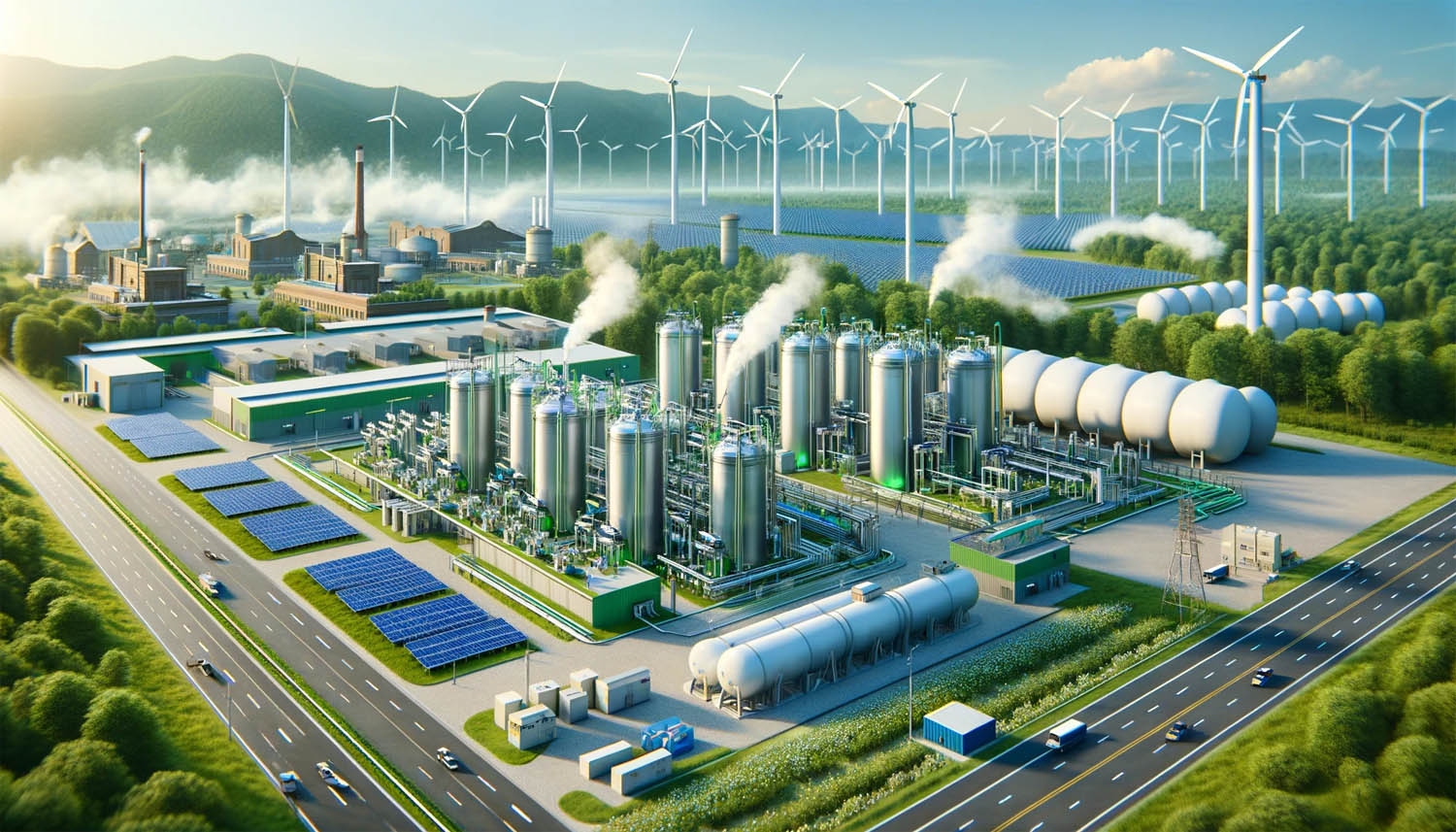The Mid-Atlantic Hydrogen Hub: Spearheading a Clean Energy Revolution
The Mid-Atlantic Hydrogen Hub emerges as a crucial venture in addressing the intertwined challenges of climate change and escalating energy demand. This initiative, endorsed by the U.S. Department of Energy, encompasses a collaborative effort among states like Pennsylvania, Delaware, and New Jersey, alongside a diverse coalition spanning community organizations to national labs. Aiming to expedite the adoption of clean hydrogen solutions, the Hub embodies a regional resolve to significantly curb greenhouse emissions while propelling economic growth and social equity. The encompassing vision of the Hub not only resonates with the broader national agenda for clean energy transition but also underscores the pivotal role of multi-sectoral alliances in advancing such transformative initiatives.
Contents
The Vision and Objectives of The Mid-Atlantic Hydrogen Hub

The vision encapsulated by the Mid-Atlantic Hydrogen Hub is reflective of a concerted regional endeavor to foster a transition to clean hydrogen energy solutions. This initiative heralds a coalition of more than 60 leading organizations across the District of Columbia, Maryland, and Virginia, bringing together a diverse range of stakeholders including community organizations, utilities, energy producers, commercial entities, government agencies, hydrogen technology providers, national labs, and academic institutions. The overarching objective of this hub is to significantly mitigate greenhouse gas emissions, accelerate market adoption and scaling of clean hydrogen solutions, thereby contributing to environmental justice and economic growth.
One of the primary objectives of the Mid-Atlantic Hydrogen Hub is to prioritize environmental and energy justice for disadvantaged communities across the Mid-Atlantic region. This is envisaged through directing social, environmental, and economic benefits to over 750 disadvantaged communities, thereby fostering an inclusive clean energy transition. The initiative also lays emphasis on workforce development, envisaging the creation and filling of approximately 8,000 jobs. This spans a broad spectrum of roles, ranging from entry-level positions to professional and managerial roles, thus creating a sustainable talent pipeline for the clean energy sector. Find out how the Mid-Atlantic Hydrogen Hub technologies compare with The Midwest Hydrogen Hub.
In a bid to ensure a well-rounded workforce readiness, the hub plans to prioritize formal and experiential training partnerships with esteemed institutions like the University of Maryland. This strategy is aimed at paving new education-to-workforce talent pathways and creating quality hydrogen-related jobs for women, people of color, and underrepresented workers, including those from rural, tribal communities and areas grappling with persistent poverty.
Moreover, the hub aims to deploy commercially viable end-uses of hydrogen encompassing a diverse range of sectors like aviation, building heat, commercial fleets, data centers, government operations, industrial operations, grid power, public transit, and trucking. This not only demonstrates the versatility of hydrogen as a clean energy resource but also underscores the multi-sectoral impact of the hub’s initiatives.
Balancing supply, demand, infrastructure, and market enablers is another pivotal objective of the Mid-Atlantic Hydrogen Hub. It envisions building a high-functioning hydrogen market while establishing replicable operating models that could serve as blueprints for other regions in the U.S. This aim aligns with the broader goal of establishing a robust foundation for a national hydrogen network, leveraging the strategic geographic location of the Mid-Atlantic region and its transportation infrastructure to integrate other hydrogen hubs across the country.
Furthermore, the Mid-Atlantic Clean Hydrogen Hub (MACH2) echoes a similar vision, with a focus on leveraging existing technology and infrastructure strengths to generate clean hydrogen, thus contributing to a national clean hydrogen network. This initiative is also poised to create and retain more than 20,000 well-paying jobs, including union jobs, and generate a new talent pipeline in the clean energy sector. It also envisions reusing and revitalizing significant existing pipeline infrastructure in a region that was formerly industrialized and is still densely populated, thereby aligning with the broader objective of reducing carbon emissions and revitalizing local economies.
In summary, the vision and objectives of the Mid-Atlantic Hydrogen Hub encapsulate a comprehensive and inclusive approach toward accelerating clean hydrogen adoption. Through multi-sectoral collaboration, workforce development, infrastructure rejuvenation, and community engagement, the hub aims to significantly contribute to the regional and national clean energy transition, making a lasting impact on environmental sustainability and economic prosperity.
Economic and Community Impact:
The Mid-Atlantic Hydrogen Hub encapsulates a forward-thinking approach toward fostering economic growth and community upliftment through clean energy initiatives. The economic impact is envisaged through significant job creation, with an aim to generate and fill approximately 8,000 jobs, spanning from entry-level to professional roles. Additionally, more than 20,000 well-paying jobs, including union jobs, are anticipated to be created and retained, establishing a sustainable talent pipeline in the clean energy sector. Moreover, with a grant amount of up to $750 million, it’s anticipated to create 20,800 direct jobs, 14,400 in construction and 6,400 permanent jobs.
Community engagement is a cornerstone of this initiative, with a strong emphasis on promoting environmental justice and inclusive growth. The hub aims to direct social, environmental, and economic benefits to over 750 disadvantaged communities across the Mid-Atlantic region, underlining a resolve for equitable outcomes. Moreover, a multi-year project named MACH2™, with an initial 12-18 month planning phase, is set to prioritize the development of a Community Benefits Plan addressing labor relations, environmental justice, diversity, equity, and community engagement, ensuring a holistic approach toward community upliftment and stakeholder involvement.
These concerted efforts underscore the transformative potential of the Mid-Atlantic Hydrogen Hub in bridging economic and community development under the clean energy ambit. Through a blend of job creation, community engagement, and environmental justice initiatives, the hub embodies a holistic model for regional clean energy transitions, setting a precedent for similar ventures nationwide.
Partnerships and Key Players:
The collaborative essence of the Mid-Atlantic Hydrogen Hub is epitomized through its diverse partnerships, bringing together over 60 leading organizations across the District of Columbia, Maryland, and Virginia. This cross-sector coalition spans community organizations, utilities, energy producers, commercial entities, government agencies, hydrogen technology providers, national labs, and academic institutions, creating a robust ecosystem poised to accelerate clean hydrogen adoption.

Key political and organizational figures have voiced their support, underscoring the initiative’s potential to drive economic and environmental benefits. Notable endorsements come from U.S. Senator Chris Coons, Pennsylvania Governor Josh Shapiro, Southern New Jersey Building Trades Council President Daniel Cosner, U.S. Representative Lisa Blunt Rochester, and Philadelphia Mayor Jim Kenney, reflecting a broad spectrum of support for the initiative across different levels of government and industry sectors.
These partnerships and endorsements underline a concerted effort to advance clean hydrogen solutions. Through multi-sectoral collaboration, the Mid-Atlantic Hydrogen Hub endeavors to create a sustainable clean energy infrastructure, fostering innovation and community engagement in a journey toward a clean energy future.
Progress and Future Plans:
The journey of the Mid-Atlantic Hydrogen Hub is marked by strategic planning and foresight, with its eyes set on fostering a hydrogen-powered economy. Progress is palpable, as seen through its advancement to the final application round for the federal H2Hubs grant program, signaling a positive acknowledgment of its potential to drive clean hydrogen production and utilization.
Future plans are ambitious and well-charted, envisioning the development of renewable hydrogen production facilities leveraging both established and innovative electrolyzer technologies. The intent is to reduce costs and drive further technology adoption, fostering a conducive environment for clean hydrogen growth. The hub also has labor and workforce commitments to the community, planning to negotiate Project Labor Agreements for all projects and earmarking close to $14 million for regional Workforce Development Boards. These boards are slated to serve as partners for community college training and apprenticeships, thereby nurturing a skilled workforce ready to thrive in a clean energy ecosystem.
In the broader scheme, the hub aspires to be a cornerstone in the national hydrogen network, envisaging a high-functioning hydrogen market that not only meets the regional demands but also sets a scalable model for other regions in the U.S. Its strategic geographic location, coupled with its transportation infrastructure, is viewed as a significant advantage in integrating other hydrogen hubs across the country, thus paving the way for a cohesive national hydrogen ecosystem.
With a blend of meticulous planning, multi-sectoral collaboration, and a clear vision for the future, the Mid-Atlantic Hydrogen Hub is poised to play a pivotal role in propelling the Mid-Atlantic region, and by extension, the nation, toward a sustainable hydrogen-powered economy. Through these planned initiatives and ongoing efforts, the hub embodies a proactive approach toward addressing the climate challenge while simultaneously fueling economic growth and social equity. The Regional Clean Hydrogen Hubs (H2Hubs) will kickstart a national network of clean hydrogen producers, consumers, and connective infrastructure while supporting the production, storage, delivery, and end-use of clean hydrogen.
Conclusion:
The Mid-Atlantic Hydrogen Hub encapsulates a transformative vision for a clean energy transition, built on a foundation of multi-sectoral collaboration and community-centric initiatives. As it navigates through the strategic roadmap, the hub exhibits a holistic model for regional clean energy transitions. The blend of economic, environmental, and social benefits, underscored by robust partnerships and governmental endorsements, underlines the hub’s potential to set a precedent for similar ventures nationwide.
By fostering a sustainable clean energy infrastructure, nurturing a skilled workforce, and driving community engagement, the hub is not merely a regional initiative but a microcosm of a broader national aspiration towards a sustainable hydrogen-powered economy.


